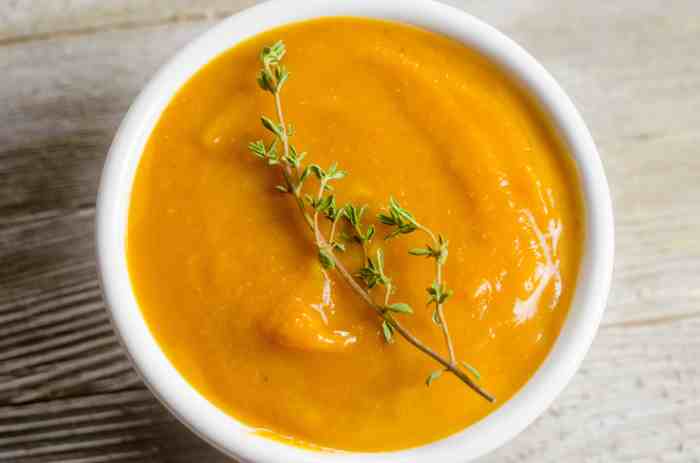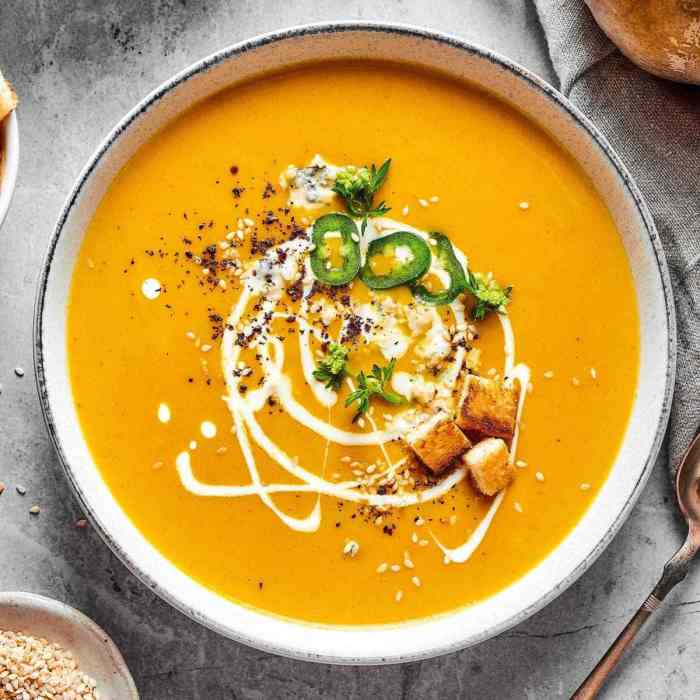Pumpkin Soup Variations
All recipes pumpkin soup – Pumpkin soup, a culinary classic, boasts incredible versatility. From creamy and rich to light and brothy, the variations are numerous, each offering a unique flavor profile and textural experience. Exploring these variations unlocks a world of possibilities, allowing for customization to suit individual preferences and culinary creativity.
Types of Pumpkin Soup
| Name | Key Ingredient | Description | Origin |
|---|---|---|---|
| Classic Creamy Pumpkin Soup | Pumpkin puree, heavy cream | Rich, velvety smooth soup with a deep pumpkin flavor. Often includes warming spices like cinnamon and nutmeg. | North America |
| Roasted Pumpkin and Apple Soup | Roasted pumpkin and apples | Sweet and savory soup with a subtle sweetness from the apples balancing the earthiness of the pumpkin. | North America |
| Curried Pumpkin Soup | Pumpkin puree, curry powder | A fragrant and flavorful soup with a warming blend of spices. Coconut milk is often added for richness. | India (adapted) |
| Pumpkin Ginger Soup | Pumpkin puree, ginger | A vibrant soup with a spicy kick from the ginger. Often includes a touch of sweetness from maple syrup or honey. | Asia (adapted) |
| Spicy Pumpkin Chorizo Soup | Pumpkin puree, chorizo sausage | A savory and hearty soup with a smoky flavor from the chorizo. Often includes chili flakes for added heat. | Spain (adapted) |
Creamy vs. Broth-Based Pumpkin Soup
Creamy pumpkin soup, typically made with heavy cream or coconut milk, offers a rich, velvety texture and intense pumpkin flavor. Broth-based pumpkin soup, using vegetable or chicken broth as a base, results in a lighter, more fluid consistency with a less intense pumpkin taste. The choice depends on personal preference; creamy soups are indulgent, while broth-based versions are lighter and potentially healthier.
Butternut Squash vs. Pumpkin in Soup
Both butternut squash and pumpkin are excellent choices for soup, but they offer slightly different flavor profiles. Butternut squash tends to have a sweeter, nuttier flavor, while pumpkin offers a more earthy, slightly less sweet taste. The texture is also slightly different, with butternut squash often being slightly firmer. Either works well in soup recipes, and the choice often comes down to personal preference.
Recipe Ingredients & Substitutions
Understanding the core ingredients in pumpkin soup allows for creative substitutions, adapting recipes to dietary needs or ingredient availability. Common ingredients and their potential replacements are detailed below, noting the impact on taste and texture.
Common Pumpkin Soup Ingredients

Source: sweetpeaskitchen.com
- Pumpkin puree
- Vegetable broth
- Onions
- Garlic
- Spices (cinnamon, nutmeg, ginger)
- Heavy cream/coconut milk
Ingredient Substitutions
| Ingredient | Substitution | Impact on Taste | Impact on Texture |
|---|---|---|---|
| Pumpkin Puree | Butternut squash puree | Sweeter, nuttier flavor | Slightly firmer texture |
| Pumpkin Puree | Sweet potato puree | Sweeter, less earthy flavor | Similar texture |
| Vegetable Broth | Chicken broth | Savory, richer flavor | No significant change |
| Onions | Shallots | Milder, sweeter flavor | Similar texture |
| Heavy Cream | Coconut milk | Creamier, slightly sweeter flavor | Similar texture |
Cooking Methods & Techniques
The method used to cook the pumpkin significantly impacts the final soup’s texture and flavor. Different techniques are explored here, highlighting their respective advantages.
Pumpkin Cooking Methods
Roasting brings out the pumpkin’s natural sweetness and creates a caramelized flavor. Steaming results in a softer, more tender pumpkin. Boiling is the quickest method but can sometimes lead to a slightly less flavorful result.
- Roasting: Produces a caramelized, intensely flavored pumpkin with a slightly firmer texture.
- Steaming: Yields a very tender, moist pumpkin with a milder flavor.
- Boiling: A quick method resulting in a soft, easily pureed pumpkin, but the flavor might be less intense.
Blender vs. Immersion Blender
Both blenders and immersion blenders effectively puree pumpkin soup. A standard blender creates a smoother, more consistent texture, requiring transferring the soup. An immersion blender (stick blender) allows for direct pureeing in the pot, minimizing cleanup.
Simple Blender Pumpkin Soup Recipe
- Roast or steam pumpkin until tender.
- Sauté onions and garlic.
- Combine pumpkin, broth, sautéed vegetables, and spices in a pot.
- Simmer for 15 minutes.
- Puree with a blender until smooth.
- Stir in cream/coconut milk (optional).
- Season to taste.
Serving Suggestions & Garnishes
Presentation significantly enhances the enjoyment of pumpkin soup. Creative serving methods and thoughtful garnishes elevate this classic dish from simple to stunning.
Creative Serving Suggestions
- Serve in hollowed-out pumpkin halves.
- Use bread bowls for a rustic touch.
- Offer as a shot in small espresso cups.
- Layer in mason jars for a visually appealing presentation.
- Serve in elegant soup tureens for a formal setting.
Pumpkin Soup Garnishes, All recipes pumpkin soup

Source: thebigmansworld.com
| Garnish | Description | Flavor Profile | Visual Appeal |
|---|---|---|---|
| Toasted pumpkin seeds | Roasted pumpkin seeds | Nutty, slightly sweet | Adds texture and pops of color |
| Crème fraîche | Thick cream | Tangy, creamy | Adds richness and a swirl of white |
| Chopped chives | Fresh chives | Slightly oniony, fresh | Adds pops of green |
| A swirl of olive oil | High-quality olive oil | Fruity, peppery | Adds shine and visual interest |
| Candied pecans | Sweet and crunchy pecans | Sweet, nutty | Adds texture and color contrast |
Visually Appealing Presentation
Plating techniques significantly influence the visual appeal. Consider using a shallow bowl to showcase the soup’s color and texture. Garnishes should be strategically placed, avoiding overcrowding. A simple swirl of crème fraîche or a sprinkle of toasted pumpkin seeds can dramatically enhance the presentation.
Nutritional Aspects & Variations
Pumpkin soup offers a wealth of nutritional benefits, and it can be easily adapted to accommodate various dietary needs. Understanding its nutritional profile and exploring variations expands its appeal.
Nutritional Benefits
Pumpkin is rich in beta-carotene (converted to vitamin A), vitamin C, potassium, and fiber. These nutrients contribute to immune function, eye health, and digestive regularity. The specific nutritional content varies depending on the recipe ingredients.
Vegan and Gluten-Free Adaptations
A basic pumpkin soup recipe is naturally vegan if you omit dairy products and use vegetable broth. To ensure it’s gluten-free, verify that all ingredients (especially broth and spices) are certified gluten-free.
While browsing all recipes for pumpkin soup, I often find myself drawn to the diverse range of flavors. For a completely different taste experience, though, you might want to check out this spicy seafood soup recipe ; it’s a fantastic contrast to the creamy sweetness of pumpkin. Then, of course, you can return to exploring the wonderful world of all recipes pumpkin soup.
Nutritional Comparison of Variations
| Variation | Calories (approx.) | Fat (approx.) | Fiber (approx.) | Vitamin A (approx.) |
|---|---|---|---|---|
| Creamy (with heavy cream) | 350 | 20g | 5g | High |
| Broth-based | 200 | 5g | 7g | High |
| Creamy (with coconut milk) | 300 | 15g | 6g | High |
Recipe Development & Adaptation: All Recipes Pumpkin Soup
Developing unique pumpkin soup recipes and adapting existing ones for large-scale preparation requires careful consideration of flavor profiles and logistical challenges.
New Pumpkin Soup Recipe: Maple-Spiced Pumpkin Soup with Toasted Pepitas
This recipe combines the classic pumpkin flavor with a touch of maple sweetness and warming spices.
- 1 medium pumpkin, roasted and pureed
- 4 cups vegetable broth
- 1/2 cup maple syrup
- 1 tbsp ground cinnamon
- 1 tsp ground ginger
- 1/2 tsp ground cloves
- 1/4 cup toasted pepitas (pumpkin seeds)
- Salt and pepper to taste
- Combine all ingredients except pepitas in a pot.
- Simmer for 15 minutes.
- Blend until smooth.
- Garnish with toasted pepitas before serving.
Challenges of Large-Scale Preparation
Scaling up a pumpkin soup recipe for a large event requires careful planning. Consistent cooking temperatures and precise ingredient measurements are crucial. Utilizing large-capacity equipment like commercial-grade blenders and stockpots is essential for efficiency.
Sensory Description of Maple-Spiced Pumpkin Soup
The soup presents a vibrant orange hue, its surface shimmering with a subtle sheen from the maple syrup. The aroma is a captivating blend of warm spices—cinnamon, ginger, and cloves—with a hint of sweet maple. A delicate, earthy undertone of roasted pumpkin complements the spices, promising a comforting and flavorful experience.
FAQ Corner
Can I freeze pumpkin soup?
Yes, pumpkin soup freezes well. Allow it to cool completely before storing in airtight containers for up to 3 months.
What type of pumpkin is best for soup?
While any cooking pumpkin works, sugar pumpkins or butternut squash are popular choices for their sweetness and creamy texture.
How can I thicken my pumpkin soup?
If your soup is too thin, you can thicken it by simmering it longer to reduce the liquid, or by adding a roux (butter and flour mixture), or a cornstarch slurry.
Can I make pumpkin soup ahead of time?
Yes, pumpkin soup can be made ahead of time and reheated. The flavors often deepen after a day or two in the refrigerator.
